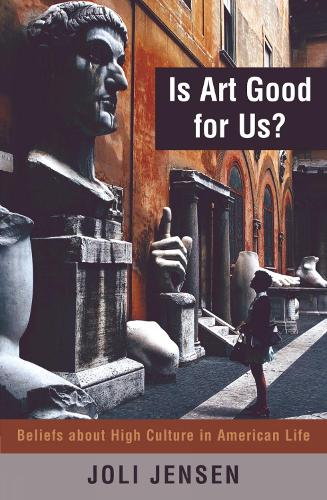
Is Art Good for Us: Beliefs about High Culture in American Life
(Paperback)
Publishing Details
Is Art Good for Us: Beliefs about High Culture in American Life
By (Author) Joli Jensen
Bloomsbury Publishing PLC
Rowman & Littlefield Publishers
8th April 2002
United States
Classifications
Tertiary Education
Non Fiction
The arts: general topics
Media studies
306.470973
Physical Properties
Paperback
224
Width 154mm, Height 227mm, Spine 20mm
354g
Description
Are the arts good for us This book questions our taken-for-granted assumptions about the transformational powers of high culture by critiquing an instrumental American heritage of beliefs about the arts. Jensen argues that faith in high culture's unproven ability to transform people and society allows social critics to keep faith with the idea of a democratic society while deploring popular culture. Instead of expecting the arts to improve things (and blaming the media for ruining them) we need to recognize that it is up to us, not the arts to make the world a better place. Visit our website for sample chapters!
Reviews
In this brilliant work, Joli Jensen speaks with the reach and range and assurance of the public intellectuals she has read so carefully. She shows that 'we have not been thinking or talking wisely or well about the arts.' Through original readings of Alexis de Tocqueville, Walt Whitman, Lewis Mumford, and John Dewey, she argues that the mass media are not so bad nor 'art' so good for us as public discourse assumes. In clear-headed, strong, and almost breathtakingly lucid prose, she helps us reconsider what we want and expect of art, criticism, and democracy. What a gift this book is! -- Michael Schudson, Columbia University
Stimulating read. * The Financial Times *
Its refreshing honesty and forthrightness require a solid argumentation, and Jensen delivers through a detailed examination and critique of the underpinnings of the instrumentalist position in social and art criticism through successive moments from the late nineteenth century to the present day. The integration of social criticism or analysis of artistic practice and communicative policies offers innovative and fresh insights and holds out a promise for a new direction in arts policy. This book should be required reading for those in the spheres of cultural-policy work and social criticism. Its clear and compelling message should be heeded by all of us who care about art, creativity, and democracy. * College Art Association *
Joli Jensen pulls all of the right strings in this fascinating analysis. -- Andrew Taylor * Artsjournal.Com *
The bluntness of Joli Jensen's title indicates the no-nonsense approach she takes to making a public case for the arts. . . . The resulting book is, quite literally, required reading. I'm assigning this volume as the opening text for my 'Cultural Policy and the Arts' graduate seminar this semester, because it frames, historicizes, and argues the essential questions so cogently. -- Ann Daly, University of Texas, Austin
Joli Jensen makes an elegant case against the modern cult of art: It isn't what art purportedly does to us, but what we do with art that matters. Jensen reveals art's true significance by defending the universality of its experience. -- Charles Paul Freund, Reason Magazine
Author Bio
Joli Jensen is professor of communication at the University of Tulsa in the US.
